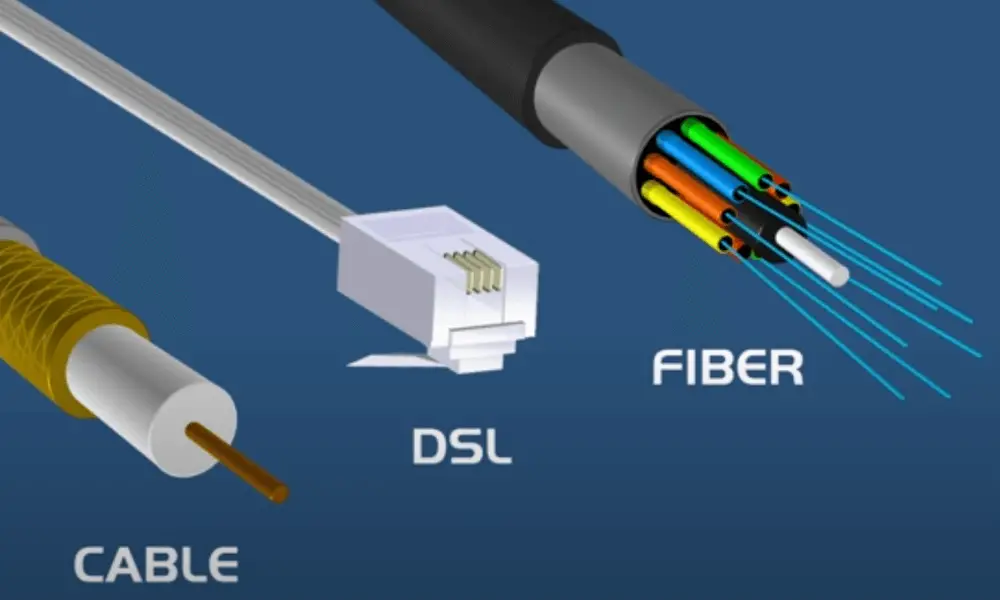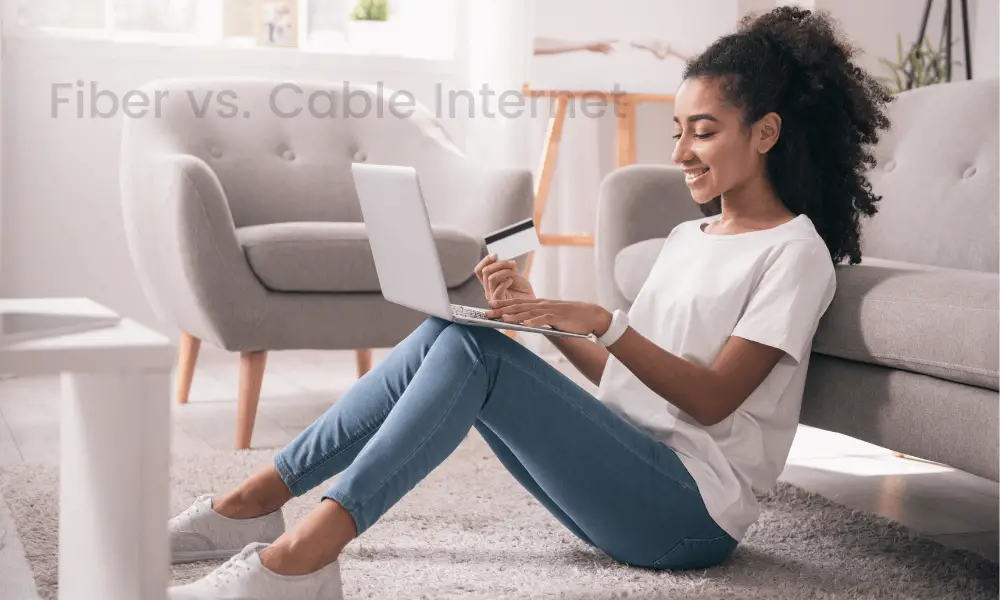There are numerous internet technologies available to the commoner these days. No more do people need to rely on the snail-like speeds of a dial-up connection. Instead, there are blazing-fast speeds thanks to technologies like cable internet and fiber-optic internet.
However, many are still confused about which internet technology they should be subscribing to. Fortunately, we are here to clear that confusion. Mentioned below is a detailed discussion about the pros and cons of a fiber-optic and cable internet connection. So, if you are struggling with the decision between either of the two, this is the place to be. Let’s get started.
What Are the Differences between Fiber-Optic and Cable Internet?
While both technologies aim to provide high-speed internet to the users, their functionality differs significantly in the background. If we talk about cable internet, it depends upon coaxial cables laid underground that are used to transmit electricity. As such, the internet transmitted through this medium is in electric signals.
On the other hand, fiber-optic internet is made possible with the help of small cables made out of flexible glass. As a result, the data transmitted through this medium is in the form of light. Compared to cable internet, this technology can simultaneously provide download and upload speed to the users.

Which Is More Vastly Available – Fiber or Cable Internet?
Both internet technologies provide connectivity to millions of people all over the country. Cable internet has been around for quite some time now. It was here long before fiber-optic internet made its debut. And since coaxial cables were already being used for other purposes, utilizing them for one extra purpose was easy to do.
In contrast, fiber internet requires a large investment to set up from scratch. All regions that need fiber-optic connectivity will require lengthy fiber-optic cables to be installed underground, thus incurring a heavy expense. As a result, fiber-optic internet is still limited to fewer regions when compared to cable internet.
Fiber or Cable Internet: Which Technology Costs More?
If we consider cable internet, it appears to be way cheaper than fiber-optic internet. This is because users or suppliers do not need to deploy large infrastructure or spread new cables to achieve internet connectivity. Moreover, cable internet plans are often cheaper than fiber-optic internet plans.
Diving into fiber-optic internet technology, you might find a significant price hike compared to cable internet. However, when you experience blazing-fast symmetric internet speeds, something that cable internet does not offer, you are bound to understand its value. In addition, the growing demand for fiber-optic internet and the surfacing of new fiber-optic options have made it possible to access cheaper fiber-optic internet plans.
See Also: Major Internet Types and How You Can Choose the Best One for You?
Fiber-Optic or Cable Internet: Do They Offer Bundling Options?
Both of these technologies offer bundling options to the users. However, if bundling is what you want to do, cable internet might be a better option. This is because cable internet service providers are likely to hold a larger TV watching variety since that is what they do.
On the other hand, Fiber-optic internet may need to turn to other services to add value to their existing internet service. That being said, several fiber-optic internet service providers offer a rich TV channel lineup and all the perks you would want from an internet and TV service provider.
Which Technology Is Faster – Fiber or Cable Internet?
Internet speed is the biggest difference between the two technologies. Considering cable internet, you would only be able to access maximum download speeds of a little over 200 Mbps. Furthermore, the upload speed in a cable internet connection will be way less than the download speed.
Then there is fiber-optic internet that is not only significantly faster with download speeds that go as high as 1 Gbps, but fiber-optic internet offers the same upload speeds as well. This is because fiber-optic internet connections are known for their symmetric internet speeds. Meaning whatever download speed you have in your plan, the same will be your upload speed as well. This difference makes fiber-optic internet way more popular as compared to cable internet.
Which Is More Reliable – Fiber-Optic or Cable Internet?
Both internet technologies can provide a reliable means for accessing the internet. However, since cable internet depends upon cables that have been deployed for a significant period, they would be subject to outages and breakdowns in case of severe weather conditions. Fiber-optic internet cables, in contrast, are relatively new would require less maintenance, and are not affected by moisture and electric fluctuations.
Fiber-Optic Internet vs. Cable Internet: Which Is Better?
To answer this question, you must figure out what kind of usage you have over the internet. Are you a family of two or ten? Do you stream YouTube videos occasionally or binge-watch entire seasons in one night? Are you a hardcore gamer or use the internet to do the occasional browse? You need to answer only some questions to determine what kind of internet would be more beneficial for you. Though one thing is for sure; if you do not want to spend much on an internet connection, cable internet is for you, as fiber-optic internet connections are relatively more expensive.
See Also: How Can I Increase the Speed of My Router (Wi-Fi)?

Best Fiber-Optic and Cable Internet Service Providers
There are quite a few internet service providers in the country that offer cable and fiber-optic internet. However, not all of them offer the high-quality internet service that every user demands. Luckily, the internet service providers mentioned below do offer high-quality internet service, and you may subscribe to any one of them:
1. Mediacom
First up is Mediacom – a proud cable internet service provider in more than 20 states in the United States, with Georgia, Iowa, and Illinois leading the race. The internet service provider now features a hybrid fiber-coaxial network, meaning the network consists of both coaxial cables and fiber optic cables in the network. As a result, Mediacom internet packages offer fiber-like speeds to the users.
Furthermore, the service provider offers several additional features to the users, such as a smart internet security suite, ample monthly data allowance, and access to dedicated Mediacom Wi-Fi hotspots in seven country states.
2. Spectrum
Next, you might find Spectrum’s internet service portfolio to be appealing. If we consider the internet speeds, this service provider offers download speeds as high as up to 1 Gbps, depending on the region you are in. Moreover, you may also have freedom from any form of data caps and enjoy unlimited browsing, streaming, downloading, and much more.
One great feature that Spectrum offers to the users is the Spectrum Internet Assist plan. Spectrum offers this plan at reduced rates for those who qualify as low-income households, and they may still enjoy decent internet speeds.
See Also: How Do I Fix My Netflix Connection Problem Code NW-2-5?
3. AT&T
Last but not least, AT&T is always worth considering. AT&T offers sensational internet speeds in its fiber-optic network. Here, you shall find access to download speeds as high as up to 1 Gbps, provided they are available in your region.
Moreover, you may also bundle your AT&T internet service with its DIRECTV service. It will enable you to access a rich TV channel lineup, a large DVR storage, and more for significantly cheaper rates.
These are a few prominent differences between the two technologies. Now that we have discussed most of them, we hope you understand which internet service will be better for you.





